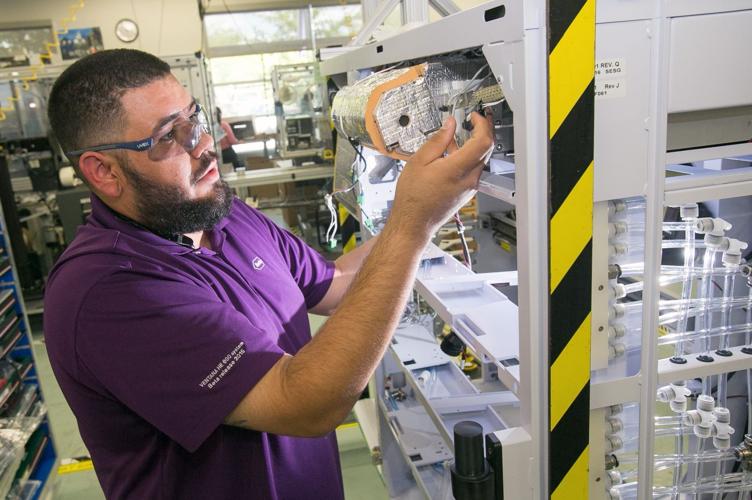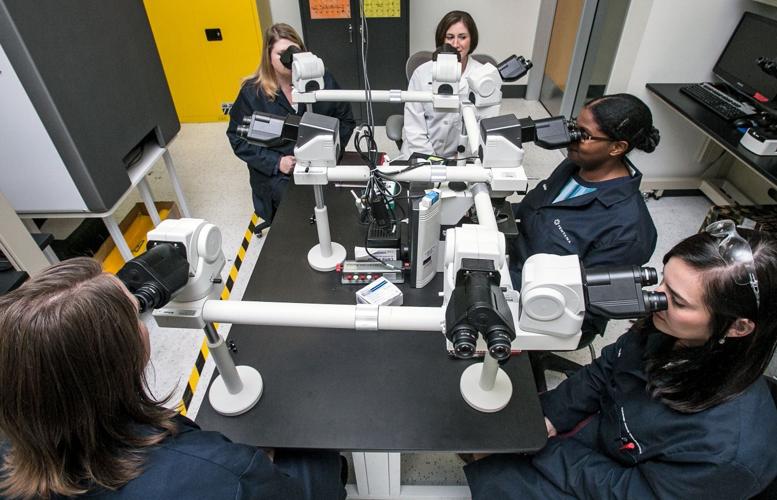Southern Arizona’s bioscience sector showed some job gains in 2015, led by Oro Valley’s Ventana Medical Systems.
Several small biotech startups also grew last year, though it will be some time — if ever — before they break into the Star 200.
Ventana, founded by University of Arizona pathologist Dr. Thomas Grogan in 1985, has continued to add staff since it was acquired by Swiss drug giant Roche for $3.4 billion in 2008.
The company, now part of Roche Tissue Diagnostics, reported 1,286 full-time equivalent employees at the end of 2015, up from 1,200 in 2014.
Ventana’s workforce has nearly doubled from about 700 before the Roche acquisition, as the company has added products and expanded its Oro Valley campus.
Most recently, Ventana built a new warehouse last year in Marana, a few miles from its main campus on Innovation Park Drive.
That prompted some new hiring, but the main driver is growth in its core business in automated tissue testing for cancer and expansion into “companion diagnostics” — tests that match patients to specific drug therapies based on genes or other biomarkers, said Dr. Eric Walk, Ventana’s chief medical officer.
Ventana now offers three FDA-approved companion tests. Two tests determine the suitability of breast-cancer patients for treatment with the drug Herceptin, made by Roche subsidiary Genentech. Another test approved last year matches patients to a drug made by Pfizer to treat non-small-cell lung cancer.
Walk recalled that when he started with the company a decade ago, the idea of companion tests was just emerging.
“Now, in 2016, it’s just the way that drugs are developed. No drugs are developed without at least a consideration of a companion diagnostic solution,” Walk said.
Ventana is busy working to develop new companion tests, beefing up staff as needed, Walk said, adding that the company expects to develop one or more companion tests a year.
The company also is moving into digital diagnostics with a slide-scanning system that automates the tasks of identifying and counting cells and can analyze multiple biomarkers using complex computer software.
“We feel the future of pathology in part will be enabled by digital technology,” Walk said.
The presence and growth of Ventana, along with several smaller, yet significant, companies, has helped boost Tucson-area employment in the bioscience industries.
And like Ventana, many local bio companies have ties to the UA either through technology or talent.
According to the latest update of the Arizona Bioscience Roadmap, a statewide strategy launched in 2002 to grow the state’s bio industry, Tucson-area employment in medical devices and equipment rose an estimated 88 percent from 2002 through 2014, while employment in research, testing and medical labs rose 36 percent and at hospitals rose 31 percent.
Just up the road from Ventana in Oro Valley, French drug giant Sanofi operates a major chemistry center that employs about 100 researchers who work to identify small molecules that show druglike properties.
New to the area in 2015 is LCMS Laboratories Inc., a California company that opened a complex lab last year in Oro Valley. The lab provides clinical diagnostics, contract research organization (CRO) support and diagnostic test development.
Other up-and-comers in the local bioscience industry include Accelerate Diagnostics, which moved to Tucson from Denver in 2013 to develop and market its technology to rapidly detect and identify bacterial pathogens.
To lure the company here, Pima County agreed to below-market lease rates and spent about $1.4 million to construct laboratories and other office amenities for Accelerate at the county’s Abrams Public Health Center.
The company has since expanded three times and as of last year employed more than 60 people, with an average salary in excess of $90,000.
The company plans to grow, though it’s still looking for its first profits.
Another growing local bio company is HTG Molecular Diagnostics, which has taken its proprietary, high-capacity platform for testing gene expression and incorporated it into an automated instrument that shrank a three-day process into a 24-hour turnaround.
Tucson-based HTG, which is working to adapt its instrument to next-generation genetic sequencers, went public on the Nasdaq last year and employs about 50 people.
Other smaller but promising local bioscience companies include:
- Cancer Prevention Pharmaceuticals, which is in clinical trials with a drug to prevent colon cancer and has filed to go public with an as-yet-unscheduled stock offering;
- NuvOX Pharma, founded by UA radiologist Dr.
- Evan Unger
- , is in trials for an oxygen-based therapy to make tumors more susceptible to radiation treatment;
- MSDx, which is developing blood-based diagnostics for neurological diseases;
- Salutaris MD, which has patented a medical device designed for minimally invasive therapy of wet age-related macular degeneration.





